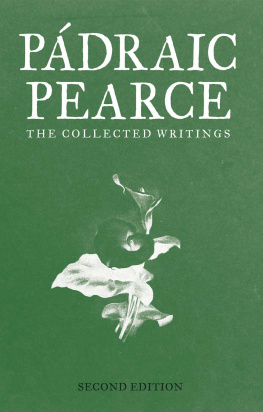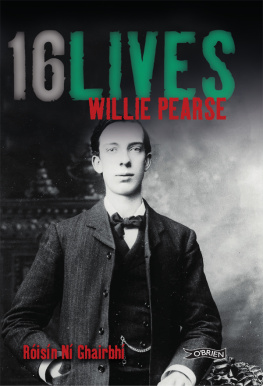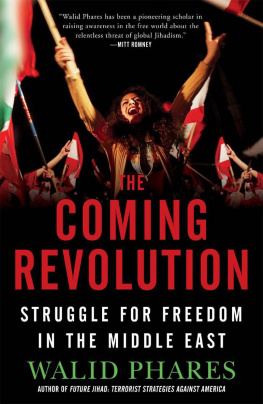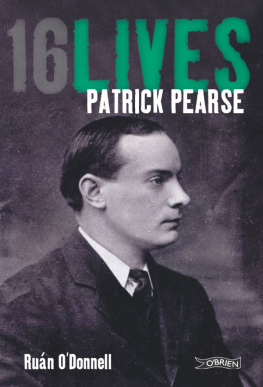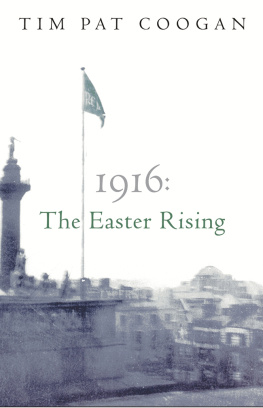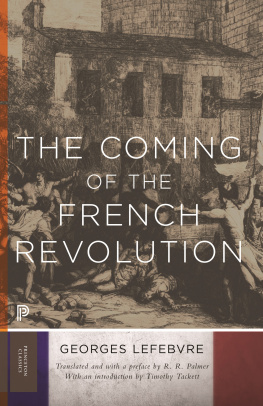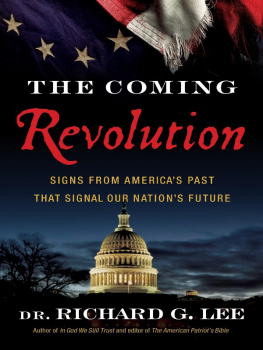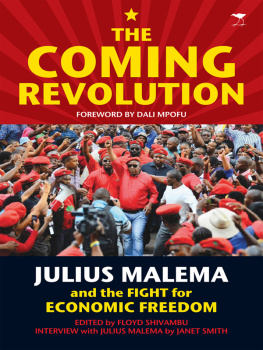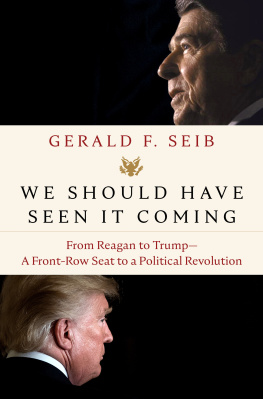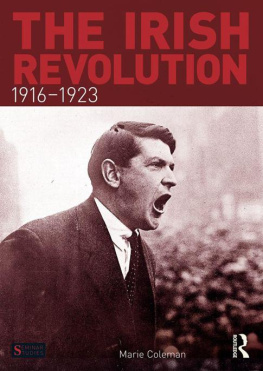Pádraic Pearse - The Coming Revolution
Here you can read online Pádraic Pearse - The Coming Revolution full text of the book (entire story) in english for free. Download pdf and epub, get meaning, cover and reviews about this ebook. year: 2013, publisher: Mercier Press, genre: Science. Description of the work, (preface) as well as reviews are available. Best literature library LitArk.com created for fans of good reading and offers a wide selection of genres:
Romance novel
Science fiction
Adventure
Detective
Science
History
Home and family
Prose
Art
Politics
Computer
Non-fiction
Religion
Business
Children
Humor
Choose a favorite category and find really read worthwhile books. Enjoy immersion in the world of imagination, feel the emotions of the characters or learn something new for yourself, make an fascinating discovery.
- Book:The Coming Revolution
- Author:
- Publisher:Mercier Press
- Genre:
- Year:2013
- Rating:5 / 5
- Favourites:Add to favourites
- Your mark:
- 100
- 1
- 2
- 3
- 4
- 5
The Coming Revolution: summary, description and annotation
We offer to read an annotation, description, summary or preface (depends on what the author of the book "The Coming Revolution" wrote himself). If you haven't found the necessary information about the book — write in the comments, we will try to find it.
The Coming Revolution — read online for free the complete book (whole text) full work
Below is the text of the book, divided by pages. System saving the place of the last page read, allows you to conveniently read the book "The Coming Revolution" online for free, without having to search again every time where you left off. Put a bookmark, and you can go to the page where you finished reading at any time.
Font size:
Interval:
Bookmark:
Copyright 2020
First Printing 2020
This particular collection was compiled by the publisher, all rights reserved.
The content of this work is in the public domain.
The foreword is the intellectual property of its author.
Cover art by Anita Hudojnik
The publisher can be contacted at
Antelopehillpublishing.com
COLLECTED WORKS OF
PDRAIC H. PEARSE
POLITICAL WRITINGS
A ND SPEECHES
WITH SELECT POEMS
FOREWORD BY SAM OHARA
ANTELOPE HILLS PUBLISHING

P D R A I C H. P E A R S E
C O N T E N T S
FOREWORD BY SAM OHARA
POLITICAL WRITINGS AND SPEECHES | DATE OF PUBLICATION |
THE MURDER MACHINE | 1912 |
HOW DOES SHE STAND | |
I. ORATION ON WOLFE TONE | 1913 |
II. ORATION ON ROBERT EMMET | 1914 |
III. SECOND ORATION ON EMMET | 1914 |
THE COMING REVOLUTION | Nov., 1913 |
THE PSYCHOLOGY OF A VOLUNTEER | Jan., 1914 |
TO THE BOYS OF IRELAND | Feb., 1914 |
WHY WE WANT RECRUITS | May, 1915 |
O DONOVAN ROSSA CHARACTER SKETCH | Aug., 1915 |
O DONOVAN ROSSA GRAVESIDE ORATION | Aug., 1915 |
FROM A HERMITAGE | Re-issued 1915 |
PEACE AND THE GAEL | Dec., 1915 |
GHOSTS | Xmas, 1915 |
THE SEPARATIST IDEA | 1st Feb., 1916 |
THE SPIRITUAL NATION | 13th Feb., 1916 |
THE SOVEREIGN PEOPLE | 31st Mar., 1916 |
THE PROCLAMATION OF THE24th April, 1916
IRISH REPUBLIC
SELECT POEMS | DATE OF PUBLICATION |
THE FOOL | Aug., 1915 |
THE REBEL | 1915 |
THE MOTHER | May, 1916 |
THE WANDERER | May, 1916 |
They think that they have pacified Ireland. They think that they have purchased half of us and intimidated the other half. They think that they have foreseen everything, think that they have provided against everything; but the fools, the fools, the fools! they have left us our Fenian dead, and while Ireland holds these graves, Ireland unfree shall never be at peace.
PDRAIC H. PEARSE
GRAVESIDE ORATION FOR ODONOVAN ROSSA
1st August, 1915
The character of Pdraic Pearse haunts the conscience of modern Ireland more than it cares to admit.
A primary architect in the events of Easter 1916 and arguably the father of the Irish Republic, his historic and cultural legacy is surprisingly ignored if not outright maligned.
While Washington of Gabridali retain a place of pride in their respective nations, Pearse is even refused the honour of a stature by contemporary Irish elites.
An Ireland with one eye on the previous northern troubles, basking in neoliberal largesse is naturally apprehensive of a poet who trained child soldiers for battle, a poet who had as his life s goal the creation of a prelapsarian Gaelic nation by armed force and who was willing to sacrifice his life for it.
Intellectuals deride him as a proto-fascist relic and point to the intellectual lineage from Pearse to the Provisional IRA. Marxists half-heartedly attempt to claim him as their own due to his apparent embrace of socialism following his alliance with the patriot socialist James Connolly. The 26 county Irish state paid some degree of lip service to Pearse right up until the emergence of the Provisional IRA in the 1960s when it became expedient to marginalize him.
A segment of Irish Catholicism even accuses Pearse of de facto paganism, with attempts to create his own personal Calvary on the streets of Dublin.
Pearse exists to-day, despite his historical impact as a rather forlorn figure, misunderstood by an Ireland he thought could have had a much more radical future.
Only through a nationalist lens does the historical place and mission of Pearse become apparent, as well as why he presents a danger to the powers-that-be to-day just as much as in 1916.
Against centuries of the slow unwinding of Gaelic civilisation , and against the behemoth of liberal modernity personified by the British Empire, Pearse emerges as an almost quixotic figure. The very soul of Ireland was rotting in his mind. Not through British domination alone, but through the cultural devaluation generated by it.
Through his work as a Gaelic activist on the Western seaboard in Gaeltacht towns like Rosmuc , Pearse became infatuated with a living tradition typified for the Irish-speaking peasantry. It was this tradition, imperiled by the onset of modernity, that sought to eradicate residual elements of Gaelic culture through economic rationalization.
Against this seeming cultural death spiral, only an act of defense could nurture a genuine national rebirth, a concept at the heart of Pearse and his project. Born of mixed heritage to an Irish peasant mother and an English artisan father, Pearse played a salient role in both cultural and physical force nationalism of his day.
An accomplished writer and Gaelic activist, he spearheaded a radical brand of educational reform at his school in Scoil anna. Fusing traditions of Irish monasticism and Gaelic folk tales with the latest ideas in educational theory, many of his students would partake in the events of Easter Week. Defined strictly against the utilitarian theories of the British schooling model, the school played host to a radical testing ground for Pearse and his philosophy. It was an Irish-speaking school where boys were versed in the tales of Na Fianna, ancient aristocratic warbands that governed Ireland, and even practiced with rifles.
Further afield, the Ireland of Pearses day was approaching a crisis point, the advent of a Catholic bourgeois in the 19th century propelling the prospect of Home Rule and awaking from its slumber the forces of Unionist reaction. The centuries-long process of Anglicanism was gathering pace with modernity, with the prospect of bourgeois nationalism in the form of Home Rule not addressing the root cause in Pearse s mind.
With the beginning of the First World War, Pearse reveled in the emergence of militant nationalism across Europe. With it came the prospect to smash the imperial apparatus governing Ireland and for a small radical vanguard to assert itself on the national stage.
Through the Irish Republican Brotherhood, a radical faction within the nationalist movement, he helped choreograph the Easter Rebellion in April 1916. Famously doomed from the start, rebels hopelessly took up strategic positions primarily in Dublin with Pearse commanding operations from the central stronghold at the Dublin s General Post Office. After a week of heavy street fighting and the destructions of swaths of inner city, Dublin nationalist forces surrendered unconditionally, with Pearse and other ringleaders executed soon after.
While initially derided as militarily incompetent, it triggered a remarkable volte-face in Irish public opinion. The rebels who were jeered by Dubliners as they were marched off to internment came home heroes only a few months later.
The Rising is very much as Pearse affair right down to the famous Proclamation largely written by the poet himself. What better way to respond to the malaise of Anglo-Saxon modernity than to mimic the heroism of C Chulainn on the streets of Dublin.
Next pageFont size:
Interval:
Bookmark:
Similar books «The Coming Revolution»
Look at similar books to The Coming Revolution. We have selected literature similar in name and meaning in the hope of providing readers with more options to find new, interesting, not yet read works.
Discussion, reviews of the book The Coming Revolution and just readers' own opinions. Leave your comments, write what you think about the work, its meaning or the main characters. Specify what exactly you liked and what you didn't like, and why you think so.

